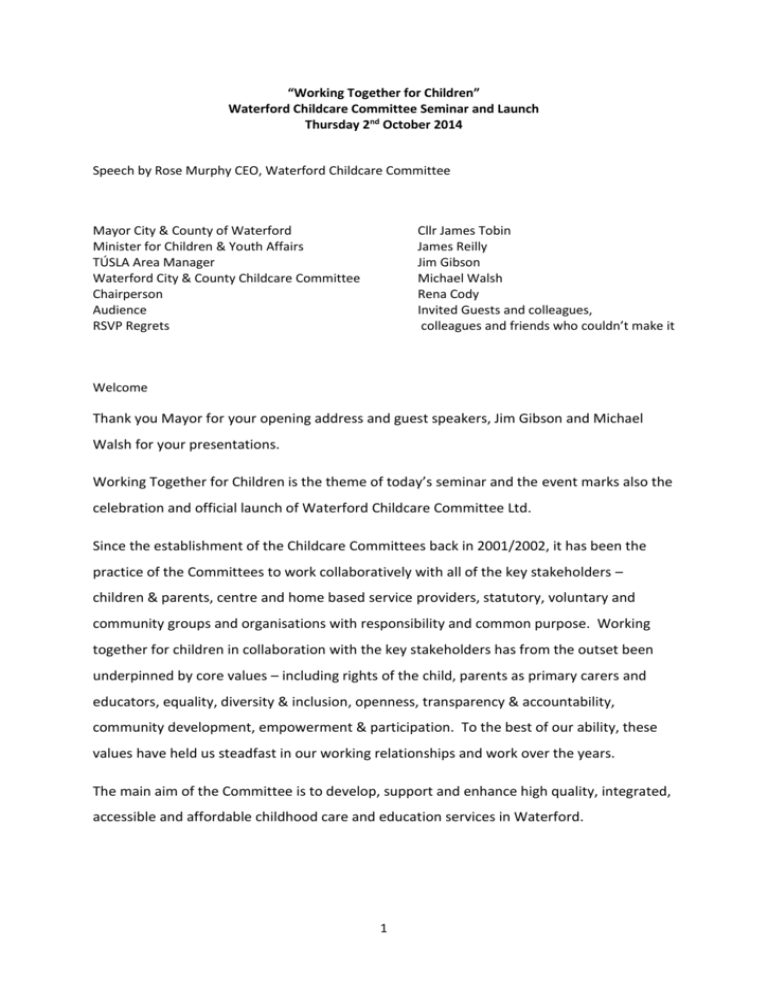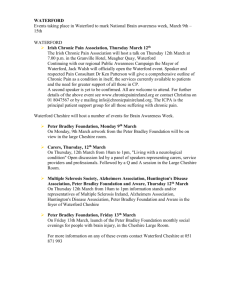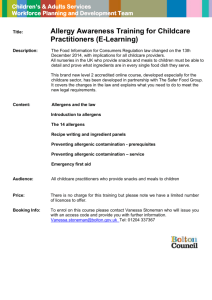Working Together for Children Presentation
advertisement

“Working Together for Children” Waterford Childcare Committee Seminar and Launch Thursday 2nd October 2014 Speech by Rose Murphy CEO, Waterford Childcare Committee Mayor City & County of Waterford Minister for Children & Youth Affairs TÚSLA Area Manager Waterford City & County Childcare Committee Chairperson Audience RSVP Regrets Cllr James Tobin James Reilly Jim Gibson Michael Walsh Rena Cody Invited Guests and colleagues, colleagues and friends who couldn’t make it Welcome Thank you Mayor for your opening address and guest speakers, Jim Gibson and Michael Walsh for your presentations. Working Together for Children is the theme of today’s seminar and the event marks also the celebration and official launch of Waterford Childcare Committee Ltd. Since the establishment of the Childcare Committees back in 2001/2002, it has been the practice of the Committees to work collaboratively with all of the key stakeholders – children & parents, centre and home based service providers, statutory, voluntary and community groups and organisations with responsibility and common purpose. Working together for children in collaboration with the key stakeholders has from the outset been underpinned by core values – including rights of the child, parents as primary carers and educators, equality, diversity & inclusion, openness, transparency & accountability, community development, empowerment & participation. To the best of our ability, these values have held us steadfast in our working relationships and work over the years. The main aim of the Committee is to develop, support and enhance high quality, integrated, accessible and affordable childhood care and education services in Waterford. 1 We are guided in our work and actions by five objectives which are based on the broader national policy goals. In the remainder of my presentation, I wish to share with you these objectives and some of the work and actions that are carried out in collaboration with the key stakeholders. I also wish to draw your attention to some of the challenges and opportunities in our work together for children in Waterford. 1. To support early years and school age infrastructure and services where the holistic well-being of children and families are fundamental. The poster board presentations show rich examples of early year’s services and quality initiatives in Waterford. The most important work with children and parents happens on a daily basis in early years centre and home based settings. The success of this work is largely dependent on the relationships between children, parents and staff within the settings. The relationships that develop are grounded in the values of mutual trust and respect and open communication and in the principles of professional practice on the part of staff. The knowledge, skills, attributes and experience of staff inform the relationships with children and parents and a primary factor in the creation of a high quality early years environment. Together these values and principles of professional practice create the happy and secure environment in which the holistic wellbeing of children and families are fundamental and in which children grow and thrive. But we know from our daily interactions with the early year’s professionals and parents that there are real problems that threaten and hamper the holistic wellbeing of children and families. For example a child attending a setting who has a disability; parents may struggle with coming to terms, finding and securing the help and supports that their child needs to ensure that his/her needs are addressed on time so that the child is given every opportunity to achieve his/her full potential; the early years setting and professional while willing, are not always equipped to respond appropriately to the needs of the child and struggle also to access the additional resources that might be needed and to access also the support of the early intervention professionals and services. The recent Annual Early Years Sector 2013 Survey showed a wide variation in the levels of support available for children with disability in early year’s settings across the country. Working together for children with disability needs our focus and attention. Waterford 2 Childcare Committee welcomes the establishment of the national Health & Education Steering Group and Department of Children and Youth Affairs Cross-Sectoral Team on Children’s Disability Issues. Its purpose is to promote closer collaboration on children’s disability issues, based on departmental policies, across health, education and children and youth affairs issues. We are pleased that a member of our staff Noirin Healy Magwa representing CCI is a member of this steering group and we hope that as a participating member of the group, Noirin will help to inform and raise awareness of the very real issues experienced by children, parents and early years professionals on the ground and help to promote closer collaboration at national and local level to bring about the appropriate and practical responses that children need. Early years settings are enriched by the diversity of children and families who attend – the equality & diversity poster board presentation provides us with rich examples of the diversity within settings in Waterford. However, from our daily interactions and from findings from the Annual Early Years Sector survey, we are aware that there are challenges for children whose first language is neither English nor Irish. We welcome and appreciate the collaboration with the local HSE Speech & Language Department who have facilitated workshops for early years professional on this topic. There are many more challenges faced by parents and early year’s settings on a daily basis – too numerous to discuss today. 2. To enhance quality early childhood education and care and school-age provision Enhancing and supporting quality has been a primary focus of the work of the Childcare Committee from the outset. Before the publication of Síolta The National Quality Framework for Early Childhood Education in 2006 and Aistear The Early Childhood Curriculum Framework in 2009, the Committee was guided by The Report on the National Forum for Early Childhood Education (1998) which addressed quality and accreditation issues and set out quality indicators and targets. Over the years the Committee has developed strong working relationships with a number of organisations to support the delivery of a range of programmes which have enriched the daily curriculum/progamme of 3 play activities with children and helped to achieve the broader national outcomes for children e.g. active & healthy; achieving full potential in learning and development; connected, respected & contributing in their world. These include for example, Buntus Start delivered in collaboration with Waterford Sports Partnership, Simon & Friends Road Safety in collaboration with the RSA, Green Preschools in collaboration with the local authority and An Taisce Green Schools. Since the publication of the national quality and early learning framework, early years settings and professionals in Waterford have actively participated in a number of initiatives to inform and upskill themselves in order to embed the principles, standards and themes of the Síolta and Aistear practice frameworks within their settings. In so doing they have greatly enhanced and improved the quality of experiences and opportunities for children in the settings. Working in collaboration with the national voluntary organisations Early Childhood Ireland and Barnardos has been central to the success and achievements and we thank our colleagues from those organisations for their work with us. The poster board presentation provides rich examples of the work to enhance quality and I wish to acknowledge and commend these early years professionals involved for their work and commitment. The recent establishment of the National Early Years Quality Support Service (NEYQSS) headed by Dr. Margaret Rodgers forms a new departure in the efforts to support and enhance quality in early year’s settings and hopefully will enrich experiences for children within settings going forward. We look forward to working with the NEYQSS in this ambition in the years ahead. The change to the Inspection structure and process is also expected to yield improvements in quality and standards within early years settings. We welcome the opportunity to work together with TÚSLA in this regard. However, the responsibility and cost of providing high quality care and education falls heavily on early years professionals and settings – this must be acknowledged and the 4 additional resources prioritised and secured to enable professionals and settings to meet the responsibilities and costs involved in achieving high quality early years environments. School age provision is largely a neglected area and badly in the need of key stakeholders coming together to address the issues both at local and national level. There are 23 school age services in Waterford doing their best to provide enriching experiences and opportunities for children on a daily basis. There is a strong demand and good uptake of the Government Schemes which specifically target and provide limited subsidies to parents seeking school age care to enable those parents to participate in training and return to work opportunities. Much work has been done but much more work is needed to develop and enhance quality within school age services and this work needs to be lead from a national level. 3. To consolidate investment in the sector in order to support the continuing development of a stable, integrated and sustainable infrastructure. Capital Investment in Waterford City and County 2002-2014 29 Community Services €9,805,622 14 Private Services €322,908 29 Community and 14 private services have received capital funding to the tune of approximately €11.1m since 2002. Investment in the county was the lowest in the South & East region overall during the period. The results from the recent Annual Early Years Sector Survey in relation to waiting lists and vacancies point to the potential need for further large scale capital investment in Waterford. The survey results show that nationally Waterford County has one of the highest numbers of children on waiting lists. With regard to county patterns from 2011 to 2013, the Report says that Waterford County has one of the most notable increases in waiting lists i.e. 2011:49, 2012:59, and 2013:182. The issue may become a problem if as the Minister has indicated a 2nd preschool year will be introduced before end of the current programme. While we welcome this additional investment, we have concern that there will not be 5 capacity and enough places available for all children to avail of this entitlement. We would greatly welcome and appreciate the opportunity for discussion and wider consultation on how best to structure and deliver any increased investment before the introduction of a 2nd free preschool year. Number of Services currently listed in Directory - 100 Community Services 44 Private Services 56 Number of TÚSLA Registered Childminders 6 Number of Parent & Toddler Groups 32 Notably following the introduction of the ECCE scheme, the number of community services reduced and the number of private services increased. Anecdotal evidence for this shift suggests that the voluntary committees who supported community services were not willing to take on board the responsibilities involved in setting up a company and being a company director. Governance is an area of concern in relation to the sustainability of community based services. There is need for more work and supports in this area. I wish to acknowledge the commitment and volunteer work of those serving on the management committees of the 44 community based services in Waterford. A lot of social capital is being generated in these local communities! Traditionally home based childcare has been a strong feature of provision in Waterford. The county which is largely rural depends on childcare provided by childminders in their own homes as full day center based services are not sustainable in small rural areas due to low density and spread of population. Up until the end of 2013, 44 voluntary notified childminders were listed on the Directory of Services and in years prior to that had between 70-100 voluntary notified childminders listed in the city and county. Regretfully the Committee received a cut in funding early in 2013 as a result the level of support to childminders has reduced significantly. The cut in funding and erosion of national policy with regard to childminding/home based childcare is reflected across the country. The issue is in dire need of our focus and attention. In an attempt to address the issue, Childcare 6 Committees Ireland (CCI) in consultation with DCYA and Pobal has established a task group at national level of which I am a member. I hope that home based childcare will receive the attention that it deserves from the Minister and his Department in the coming year and particularly in light of the fact that it is a preferred choice for many parents and the only sustainable option for childcare in rural areas. It is also a source of income for many families and self-employment opportunity - for women in most instances. It would seem that the Department & Government has decided on non-regulation of this sector – therefore our challenge is to find new and innovative ways to promote and support self-regulation in this area. As we have seen from the high number of voluntary notified childminders in the past and from our evaluation of the National Childminding Initiative in Waterford City & County carried out by Dr. Mary Daly – we know that there is scope for improvements in this area. We wish to acknowledge and thank local TD Ciara Conway for her interest and work in this area - she has been a champion for the cause. Number of Services in Schemes ECCE 89 CCS 22 TEC 39 Number of Children Accessing Schemes 2013/14 ECCE CCS 1692 780 TEC The Committee has been working closely with the Department, Pobal, CCI and services and welcome the development and introduction of the Programme Implementation Platform (PIP) which will be launched and become live early next week. It is envisaged that when 7 fully operational PIP will streamline and lighten the administrative burden of the schemes for services and free up staff to focus their attention and time to the children where it is most needed. The reality is that many services do not have administrative staff to wholly deal with the administration of schemes and the attention of staff has in the past been diverted during the critical transition period for the child at the beginning of the preschool year when the child is settling in and at the end of the year when the child is preparing to transition to primary school. It is hoped also that PIP will alleviate the delays in registration of children, transfers, confirmation of entitlement to schemes and payment of schemes – delays that hinder the smooth running of services and are a potential threat to sustainability of the service Childcare Fees From the recent Annual Early Years Survey the national average weekly fee for a full day place for a child older than one year is €166.63 and for a baby the average fee is €173.02. The national average weekly fee for a part-time place is €94.88 and for a sessional place the average fee is €65.18. The national average fee for a childcare place is higher in urban facilities than in rural facilities. The average fee for a full day place for a child older than 1 year for example is €174.48 in urban services, 9.2% higher than the average of €159.76 in rural areas. Following a sharp drop in average charges in 2009, the Report has found that average fees have climbed back up to 2008 levels in the years 2012 and 2013. Average Childcare Costs compared to National Costs taken from Annual Early Years Sector Survey 2013 Full-Time Babies (>1) Sessional School Age National Average Weekly Fee €166.63 €65.18 €70.59 Waterford City – Average Weekly Fee €165.20 €65.09 €64.00 Waterford County – Average Weekly Fee €152.00 €56.90 €60.00 8 Some of you will have seen the Primetime pre budget debate on cost of childcare and whether it should be subsidised on Tuesday last – this is a serious and pressing topic. The primary role of parents is upheld in the Irish Constitution. Parents are responsible for rearing, caring and educating their children and in so doing weave the fabric of our society. Society and Government in turn have a duty to support parents in their primary role for the betterment of society at large, to enable parent to generate income for their family and contribute to the creation of wealthy economy for the benefit of society. As we know, the cost of childcare is too high and climbing and unaffordable for many parents. For many services the income generated from schemes and fees does not adequately meet the costs incurred in the provision of services. Wages constitute the highest cost for services yet wages paid to staff are low. Many services are increasingly becoming unsustainable. The financial sustainability of full day community services is of particular concern in addition to the perils regarding governance mentioned previously. Increasingly services are eating into their reserves and are showing ongoing deficits. This is not sustainable and in light of the substantial capital investment that has been made to the development of a childcare infrastructure, the issue is critical. Additional government investment is needed to help parents meet the cost of childcare; and for services to meet the costs incurred in providing childcare that is of a high quality. The level of government investment in Ireland is meagre comparative to European countries and the cost to parents is one of the highest in Europe. I call on the Government and the Minister to prioritise and ring-fence the additional investment in the forthcoming and successive budgets to ensure that by 2020 Ireland can pride itself on rising to the top of the European tables knowing that we have invested well for better outcomes and a brighter future for our children. 9 4. Through ongoing professional development, to build on the capacity of the early childhood care and education (ECCE) sector to enhance and develop quality services for children and their families Staff Qualifications taken from Annual Early Years Sector Survey 2013 City County National Average FETAC Level 5 or above 90.3% 94.1% 87% FETAC Level 6 or above 47.2% 55.6% 46.6% FETAC Level 7 & 8 27.5% 17.8% 12.3% The Committee has worked closely with local training providers including the Education and Training Board (ETB) and Institutes of Technology (IT) Waterford and Carlow to promote and support opportunities for continuing professional development, access, transfer and progression routes for staff working in early year’s settings. From the outset the Committees promoted, supported and encouraged staff to avail of CPD opportunities and the findings with regard to staff qualification from the recent Annual Early Years Sector Survey reflect the collaborative efforts of the Committee & training providers but more importantly the commitment of staff to their continuing professional development. The setting of a minimum standard of FETAC Level 5 for all staff by September 2015 is to be welcomed but far short of the EU target of 60% of staff qualified at degree level. The establishment of the Learner Fund to assist staff who need to gain the minimum qualification requirement is also welcome. The requirement for staff to maintain mandatory training requirements including for example first aid, food & fire safety, manual handling, child protection has time and cost implications for services and staff but critically important for quality and safety within settings. The establishment of the Association of Childhood Professionals (ACP) operating at local and national level is an important development in raising awareness, promoting and advocating on behalf of the early years and school age professionals. The Committee is pleased to work closely with the ACP in the achievement of its aims. 10 5. To ensure effective and transparent collaboration, communication and consultation, and optimum use of resources by all stakeholders in early childhood care and education. As expressed at the beginning of my presentation, since the establishment of the Childcare Committees back in 2001/2002, it has been the practice of the Committees to work collaboratively with all of the key stakeholders underpinned by values of openness, transparency and accountability and we have endeavoured to do this to the best of our ability. As we have heard from Jim and Michael in their presentation, significant changes to local infrastructure has taken place which has an impact on how we will work together for children and families going forward. We welcome the establishment of the Waterford Children & Young Persons Services Committee (CYPSC) and the opportunities for collaboration and coordination of support and services that this will bring. We envisage that the CYPSC will provide us with a structure, a plan and a process for working together to create better outcomes and hopefully brighter futures for children in Waterford - we are aware of constraints however in that the work undertaken will largely be within our existing resources which will certainly call for smarter use of those limited resources. References: Centre for Early Childhood Development and Education, (CECDE), (2006), Síolta, The National Quality Framework for Early Childhood Education Dublin: CECDE Dr. Mary Daly, (2011) Review of the National Childminding Initiative in Waterford City & County, Waterford City & County Childcare Committees Forum Secretariat, (1998) Report on the National Forum for Early Childhood Education, Dublin: The Stationery Office. National Council for Curriculum & Assessment (NCCA) (2009) Aistear the Early Childhood Curriculum Framework Pobal (2014), Annual Early Years Sector Survey 2013 11 12







![South east presentation resources [pdf, 7.8MB]](http://s2.studylib.net/store/data/005225551_1-572ef1fc8a3b867845768d2e9683ea31-300x300.png)
